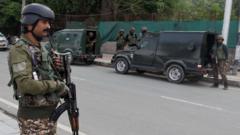Following intense military clashes between India and Pakistan, US President Donald Trump announced an unexpected ceasefire agreement between the two nuclear-armed nations on Saturday. The agreement, reached after four days of escalating violence, has brought a temporary reprieve amid fears of a full-blown conflict.
In the wake of a deadly militant attack that left 26 tourists dead in Indian-administered Kashmir last month, both nations engaged in aggressive military actions, including airstrikes and artillery exchanges. Throughout this crisis, whispers of US mediators working behind the scenes underscored the importance of international diplomacy in stabilizing the region.
Experts have emphasized the critical role played by US Secretary of State Marco Rubio in facilitating discussions between Pakistani Army Chief Asim Munir and Indian officials. The involvement of international actors—particularly the United Kingdom and Saudi Arabia—also contributed to a coordinated diplomatic response aimed at preventing further escalation.
Despite the ceasefire announcement, both countries quickly traded accusations of violation, highlighting the fragility of the agreement. While Indian officials accused Pakistan of "repeated violations," Pakistan's leadership asserted its commitment to maintaining the ceasefire, urging "responsibility and restraint."
Analysts recount how the US's approach differed this time; initially, US officials, including Vice President JD Vance, adopted a hands-off stance. As tensions mounted, the US stepped in to lead renewed discussions, showcasing the evolving dynamics in international diplomacy.
Experts remain cautious, warning that while the ceasefire signals a potential thawing of relations, it may not hold in the long run. The rapid pace of the agreement, coupled with lingering distrust, raises concerns about its durability. "This ceasefire is bound to be a fragile one," notes foreign policy analyst Michael Kugelman, expressing doubts about the commitment from both sides to uphold the agreement.
With vested interests from both nations, as well as external forces keeping a watchful eye on the developing situation, only time will reveal the true effectiveness of the recent diplomatic efforts in ensuring peace between India and Pakistan.
In the wake of a deadly militant attack that left 26 tourists dead in Indian-administered Kashmir last month, both nations engaged in aggressive military actions, including airstrikes and artillery exchanges. Throughout this crisis, whispers of US mediators working behind the scenes underscored the importance of international diplomacy in stabilizing the region.
Experts have emphasized the critical role played by US Secretary of State Marco Rubio in facilitating discussions between Pakistani Army Chief Asim Munir and Indian officials. The involvement of international actors—particularly the United Kingdom and Saudi Arabia—also contributed to a coordinated diplomatic response aimed at preventing further escalation.
Despite the ceasefire announcement, both countries quickly traded accusations of violation, highlighting the fragility of the agreement. While Indian officials accused Pakistan of "repeated violations," Pakistan's leadership asserted its commitment to maintaining the ceasefire, urging "responsibility and restraint."
Analysts recount how the US's approach differed this time; initially, US officials, including Vice President JD Vance, adopted a hands-off stance. As tensions mounted, the US stepped in to lead renewed discussions, showcasing the evolving dynamics in international diplomacy.
Experts remain cautious, warning that while the ceasefire signals a potential thawing of relations, it may not hold in the long run. The rapid pace of the agreement, coupled with lingering distrust, raises concerns about its durability. "This ceasefire is bound to be a fragile one," notes foreign policy analyst Michael Kugelman, expressing doubts about the commitment from both sides to uphold the agreement.
With vested interests from both nations, as well as external forces keeping a watchful eye on the developing situation, only time will reveal the true effectiveness of the recent diplomatic efforts in ensuring peace between India and Pakistan.

















